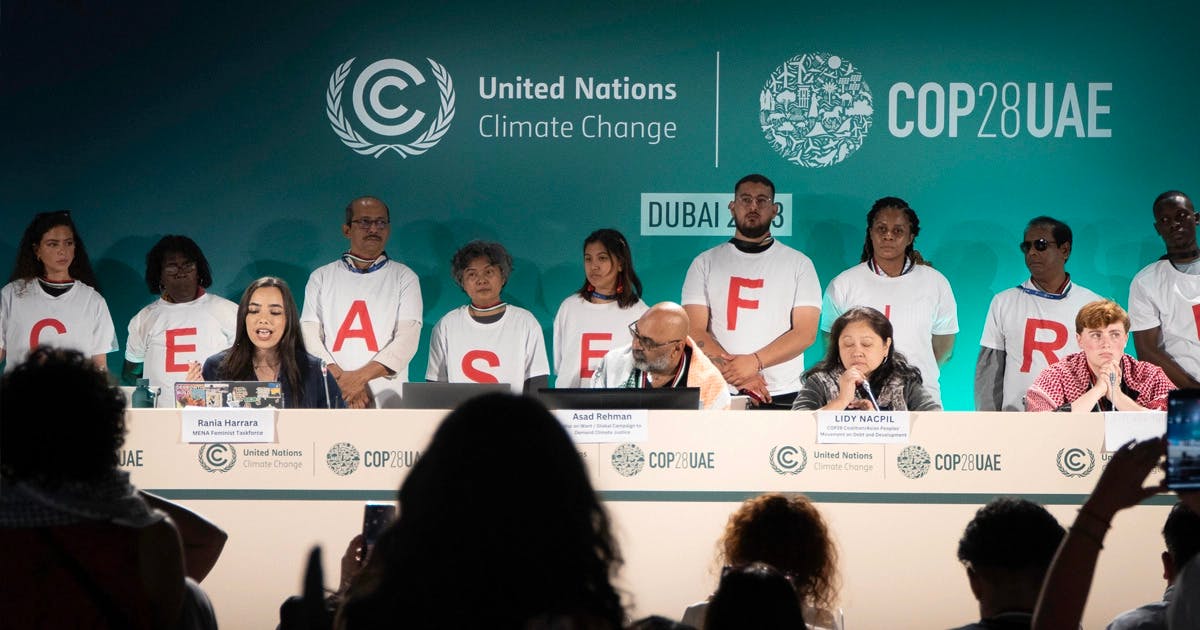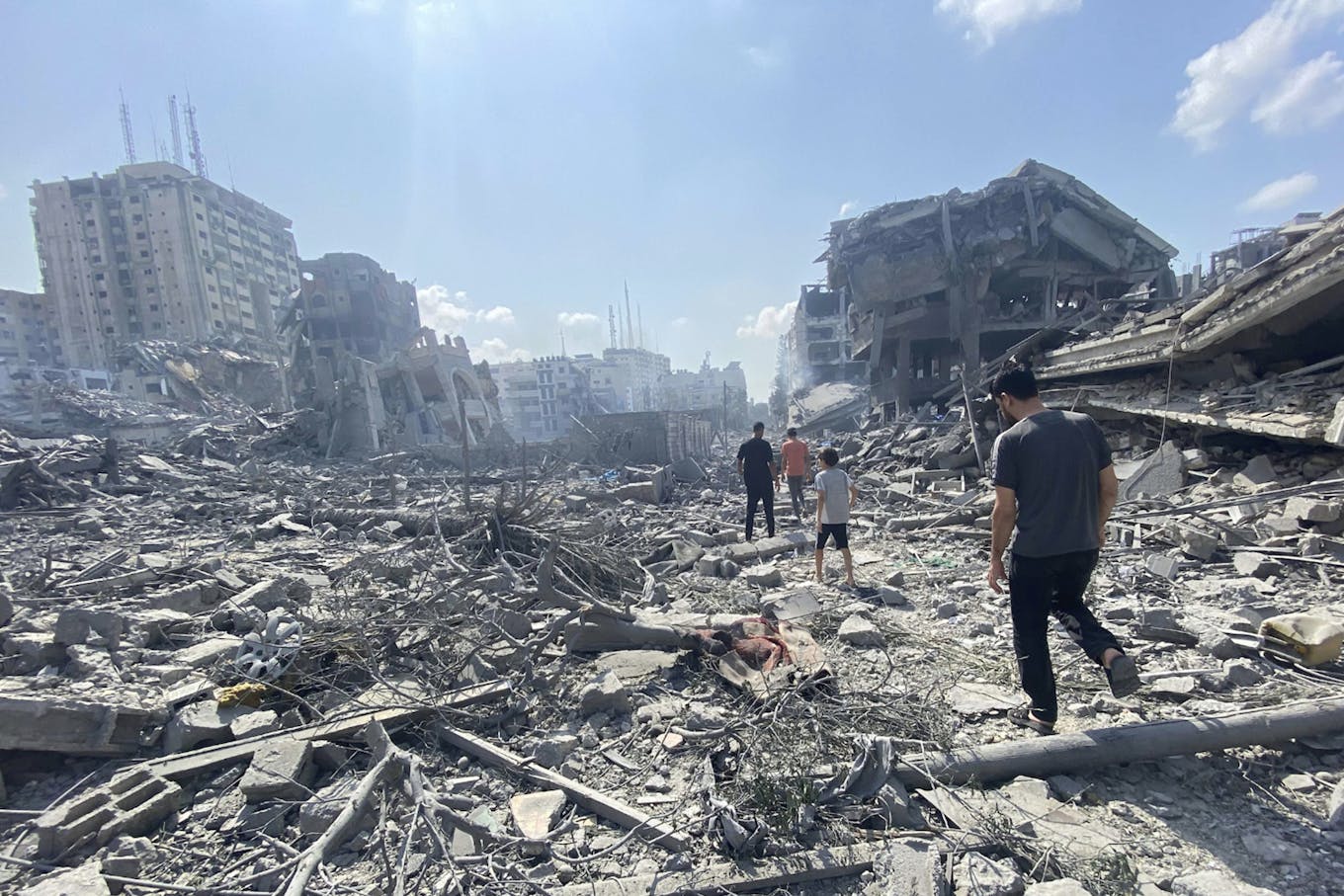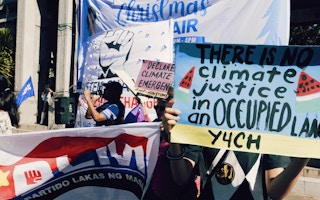As the death toll from Israel’s invasion in Gaza steadily climbed in past months, a nature guide in Singapore organised nature walks to raise money for relief efforts. Youth climate activists in the Philippines demonstrated for a free Palestine. Dozens of Asian environmental groups joined a global call for ceasefire, humanitarian aid, and eschewing religious hate.
To continue reading, subscribe to Eco‑Business.
There's something for everyone. We offer a range of subscription plans.
- Access our stories and receive our Insights Weekly newsletter with the free EB Member plan.
- Unlock unlimited access to our content and archive with EB Circle.
- Publish your content with EB Premium.
Several environmental advocates in the region have lent their voices to the growing crisis, campaigning on grounds of humanity and justice, which they say are inseparable from environmental issues.
Over 28,000 people have died in Gaza since hostilities flared in October 2023. Hamas militants from the coastal Palestinian enclave had launched an attack into Israel that left 1,200 people dead, prompting the fierce retaliatory offensive in Gaza’s dense urban settlements. Civilians form the majority of deaths on both sides.
The United Nations believes that war crimes have been committed by both parties, while the International Court of Justice is examining whether Israel has committed genocide in its Gaza offensive. The conflict has become a major flashpoint worldwide, fuelling heated debate that has sometimes turned violent.
“Human rights is central to the issue of climate justice. We cannot truly solve the climate problem if countries are in violence, repression, fear and militarisation,” said Lidy Nacpil, coordinator of Philippines-based Asian Peoples’ Movement on Debt and Development, which focuses on social and climate issues in the region.
“The social transformation needed [to solve the climate crisis] requires countries to be politically stable and democratic,” Nacpil added.
At last December’s COP28 global climate summit held in the United Arab Emirates, Nacpil organised a group of civil society organisations to demand, among others, a ceasefire in the Gaza conflict, and an end to the blockade and occupation of Palestine.
Gaza is one of the two lands of Palestine. After several wars, neighbouring Israel now blockades Gaza and has the West Bank – the other Palestinian territory – under military rule that many including the UN consider oppressive and illegal. The current conflict is the deadliest in recent history.
Nacpil said Asian civil society movements have long expressed solidarity with Palestine, and the current movements are “very much a continuation of the support”. The situation differs somewhat from that in Europe, where climate groups are reported to be more divided on their stand, especially in countries like Germany where the experience of the Holocaust and Jewish suffering still influences its relations with Israel.

A coalition of advocacy groups called for a ceasefire in Gaza at the COP28 global climate summit in the United Arab Emirates in December 2023. Lidy Nacpil (seated, second from right) from the Philippines helped convene the initiative. Image: Asian Peoples’ Movement on Debt and Development.
For Krishna Ariola, convenor of advocacy group Youth for Climate Hope from the central Negros region in the Philippines, the group’s campaign for Palestinian freedom is tied to its scrutiny on exploitation by powerful nations.
“Calling for the freedom of Palestinians is not a distraction to our calls for climate justice, because our calls have always been rooted in systemic change. What we’re trying to change is the exploitative and extractive [ways] of the Global North on communities like ours,” Ariola said.
The group, which campaigns on the environmental and social harms of fossil fuel expansion in Southeast Asia, started holding and joining demonstrations from late October last year. It is part of a “Freedom from Colonisation Negros” coalition, which also released a magazine featuring local writers supporting Palestinian liberty.
Ariola said she is also planning on speaking about the role of fossil fuel interests in the latest conflict. In recent weeks, Israel has approved gas exploration in its waters, a move that raised eyebrows as it had in past years rebuffed Palestinian development of its oil and gas resources. There was a tentative Israeli nod for Palestine to develop a gas field off Gaza last year, though plans are now likely scuppered.
Other environmental groups in the region, including Singapore’s SG Climate Rally, Malaysia’s Klima Action Malaysia and Indonesia’s WALHI (Indonesian Forum for Environment), have also pitched in to calls for a ceasefire in Gaza.
Isaac Neo, an SG Climate Rally representative, said the group’s main concern is the unfolding humanitarian crisis, before raising awareness on issues of climate justice. On social media, the group wrote about how Israel’s occupation of Palestinian lands results in water and land insecurity that worsens climate vulnerability.
SG Climate Rally also wrote online that there is “clear asymmetrical impact on the Palestinians and disproportionate use of force by Israel”. The group supports a petition for Singapore to end diplomatic relations with Israel.
Activists also highlight the environmental impact of ongoing military operations. On its social media platform, SG Climate Rally summarised a report which indicated how the climate cost of the first 60 days of Israel’s military response was equivalent to burning at least 150,000 tonnes of coal. Pius Ginting, coordinator of Indonesian environmental nonprofit AEER that signed an open letter for ceasefire and more aid to Gaza, told Eco-Business he was also concerned about how military spending for the conflict could strip climate funding for developing countries.

Aftermath of an Israeli airstrike in Gaza in October 2023. Image: Wikimedia Commons/ Wafa.
Still, the humanitarian crisis overshadows such worries. “One cannot care for the environment without thinking about people. While it is true that dropping bombs result in a lot of carbon emissions, it would be tone deaf to just speak on that without addressing the catastrophic impact it has on the lives of the people in Gaza,” said sustainability advocate Audrey Yang, who had rallied fellow Singaporeans to join a demonstration for Palestinian freedom in London.
“I did not speak up ‘as a sustainability advocate’, I did so as a human being. If something as horrifying as a genocide cannot get one to speak up, what will it take?” she said.
The International Court of Justice last month told Israel to prevent genocide and punish perpetrators, after South Africa brought the country to the world court over its actions in Gaza. A ruling on whether Israel has already committed genocide could take years, and Israel rejects the charge.
Against the tide
Environmental advocates in the region who are voicing support and solidarity with Palestine have also had to face public opposition and, at least in Singapore, state restrictions.
A comment on SG Climate Rally’s online posts said that picking sides will not bring enduring peace, and that the climate movement does not benefit from being connected to the conflict. The group replied it “respectfully disagree[s]” with the points and elaborated on its stance. Another comment accuses the group of “inciting hate and rage”, antisemitism, and playing into “exactly what Hamas is engineering”, which the group addressed via private message to the user.
“Sometimes, you just have to agree to disagree, and let go,” Neo from SG Climate Rally said, adding that the group’s followers are generally receptive to its messaging.
SG Climate Rally is one of the few Singapore environmental groups publicly vocal on the Israel-Palestine conflict. Civic space for discussing the issue is restricted, with the government effectively banning public demonstrations related to the war in Gaza on grounds of public safety. Neo has spoken in a private meet-up, though in a personal capacity.
Other climate activists in the city-state have been more outspoken in their private social media channels with friends. Some have briefly touched on the topic in environmental meet-ups, without advertising the topic beforehand.
“It’s heartening to see more people rising up in Singapore, especially the youth, who are bravely and creatively organising in support and resistance. The bigger the community, the more sustaining the movement becomes, so right now, I am more hopeful than ever,” said Yang.
“
One cannot care for the environment without thinking about people…I did not speak up “as a sustainability advocate”, I did so as a human being.
Audrey Yang, Singaporean climate and social justice campaigner
In Negros Occidental, Philippines, the demonstrations by Youth for Climate Hope is taking place in a city with strong support for Israel, with streetside flags and banners to show.
“We’ve always operated on the premise that even if we cannot win the discussion, it is still worth it to show that there is another voice, another opinion,” she said, adding that she personally receives threats online.
A recent incident at a local Israeli-owned cafe – someone had shattered a window using a rock inscribed with the words “Free Palestine” – also has Ariola reflecting on the need for a “healthy and safe space” to express opinions. Such violent reactions cannot be condoned, she added.
Yet others are trying, amid polarising debate, to offer a common language through ecology. Singaporean nature guide Pamela Ng initiated two mangrove night walks in December to raise funds for the Palestine Children’s Relief Fund. Almost 50 participants turned up and pitched in S$3,000 (US$2,229).
“The walks were to highlight how much we have here [in Singapore], and hopefully, people will realise that we need a clean, healthy and functioning ecosystem for everyone to thrive together,” she added.
“It is not about my space, your space, my people, your people. We only have one Earth, so can we just provide a quality environment for everybody…why can’t we do it right for every human being and creature around us?” Ng said.










